“The radical agenda today is all about understanding, mastering, harnessing the technological revolution — everything else is secondary to that.”…reports Asian Lite News
Sir Tony Blair has warned that Sir Keir Starmer will inherit “a country that’s in a mess” if Labour wins next year’s UK general election, and that the party must accept it will not be able to tax and spend its way out of trouble.
The former Labour prime minister praised Starmer for saving Labour from “the brink of extinction”, and insisted he will not be a back seat driver if his party returns to office in an election expected next year.
But in an interview with the Financial Times, Blair said Starmer would confront a much worse economic situation than the one he inherited from John Major’s Tory government when he won his first election in 1997.
“If Keir Starmer wins the election, which I think he’s got a good chance of doing, he’ll be the sixth prime minister in eight years,” said Blair. “That’s a country that’s in a mess. We are not in good shape.”
He said critics of Starmer who said his policy offering was too bland were talking “nonsense” and that Labour had to hold to the centre ground and stop “equating being radical with just taxing and spending”. “The Conservative party has taxed and spent to the point where we’re in an economic crisis,” said Blair.
“The radical agenda today is all about understanding, mastering, harnessing the technological revolution — everything else is secondary to that.”
Blair, who won three elections in a row, is once again an influential figure with Labour, and his Tony Blair Institute for Global Change will host a series of events at the party’s annual conference in Liverpool next month.
But the former premier said that while he met Starmer “reasonably frequently”, the current Labour leader was “his own person” who deserved credit for vanquishing the hard left and making his party electable.
After years of being vilified by some inside Labour — his name was booed at the 2011 party conference and he was dubbed a “war criminal” because of his support for the Iraq war — Blair is back.
He is the only Labour politician born in the past 100 years to have won a general election, a detail that he said was a “shocking” indictment. “I’m afraid it has not been a successful political project.”
He said Starmer had shown “agility and determination” in remodelling Labour after his hard left predecessor Jeremy Corbyn, adding: “I didn’t give up on Labour. But I think the Labour party would have been finished if we had carried on under Corbyn.”
Blair’s new mission is to persuade political parties — not just in the UK — that they must embrace tech and change the way they govern if they are to deliver high-quality public services in an era of high taxes and debt.
He said that if this sounded like the kind of thing the current prime minister Rishi Sunak would wholly endorse, that was a good thing, because it might help Starmer to build a consensus in office.
Blair argues that generative artificial intelligence and other tech developments can revolutionise healthcare and the fight against crime, among other things — but only if governments understand how to use them.
He said the civil service had to be completely overhauled to reflect the coming change. “The civil service is an excellent institution if you’re trying to maintain the status quo,” he added.
Dominic Cummings, Boris Johnson’s former chief adviser, had similar ideas, trying to recruit “weirdos” and tech nerds into the heart of government. “Some of what he says is sensible,” said Blair. “Some I totally disagree with.”
Blair and former Conservative leader Lord William Hague have called for all citizens to have digital identification cards, in an echo of the physical ID cards that he tried and failed to introduce when he was prime minister.
“It was right then and it’s a thousand times more right now,” he said, arguing that citizens need to be able to engage with the “21st century strategic state”.
Blair acknowledges that there are “big worries” associated with the use of ID cards and over the protection of personal data. But he said the tech revolution was coming anyway — and that politicians needed to regulate it, just as they did with health and safety rules in the wake of the industrial revolution. Blair channels many of his ideas through his think-tank cum consultancy. He said his not-for-profit institute — “we’re not a charity” — has about 80 policy staff, out of a total payroll of about 800, many working on global issues, and its advice is available to political parties around the world.
ALSO READ-Sunak Addresses Sikh Detention Issue in Talks with Modi














